|
I was incredibly lucky to have played music in the 1980s and early 90s with a wide variety of fine musicians, so I thought I would write about some of them. During our time with the band, Paul and I worked with four different drummers. Charles Ross, who was going by Chuck then, was the first. Chuck was married with three kids. We had two kids around the same age, so it worked well. We had the same sensibilities about being a community, and our families mingled with shared meals and the kids becoming friends. Paula liked being in charge of the kids while we rehearsed in their living room. She was the earth mother type. It was a relief to me that, although I was that same earth mother type, I could now rehearse with my kids around and not have to juggle that with my musician role while I was working. We usually couldn’t afford to hire a babysitter and Mom wasn’t willing to help out in that way, so Jessie and Justin came with us to most places. They even came to many of our gigs. They enjoyed being in the middle of everything. Justin would tire early and always found a comfy out of the way place to go to sleep, often lying on top of our coats under a table where no one would step on him. Like his dad, he loved being on the floor. Jessie was a night owl and stayed wide awake working the crowd and meeting lots of new people. Although they were both pretty self-sufficient, I still needed to be available to them. I became an expert at multitasking. I could be singing and playing my part, while listening to one of my children. They would then patiently wait for an instrumental when they knew I would respond without ever missing a beat. It was a finely honed skill, but with Paula being the “house mom,” I was free to just be immersed in the music.
Chuck brought an old friend of his into the band to play bass. As soon as we had arrived in upstate New York, we’d put an ad in Metroland, the local arts weekly. Although it was a bit of a trek to go to Schenectady so often, it was worth it. We started out with them as Cosmo Rock, though none of us was happy with that name. We soon became General Eclectic after noticing the General Electric neon sign while taking a break during a gig at the Electric Grinch where we explained for the umpteenth time, when asked how we would classify our music, that we were “generally pretty eclectic.” The name stuck, but Chuck and Dave didn’t. A talented and innovative drummer, Chuck eventually had to move on to better paying gigs, which we understood and encouraged. Dave, who was dealing with personal issues, moved out of town. Paul and I worked as a duo again for a little while. Then, at one gig, we met a handsome young man who kept his cigarettes rolled up in the sleeve of his white t-shirt. This was Andy Culver. He started coming to every show. We always saw him at other shows too when we went out. He might have been the most active fan in Albany. He soon introduced us to Andy Roth. Andy was a Deadhead and played electric guitar in Jerry Garcia’s style. He was also an artist, mostly a potter. Musically, he fit right into our style and wrote his own songs. Now we had a new musical family. We spent tons of time together, playing music and partying. There were lots of parties where Paul I just played music the whole time. We’d play for hours and hours. I took breaks to check in on the kids, making sure they ate and were engaged then returning to the endless jams. We jammed with more people than I can even count. There were always lots of guitars and singers. I loved the opportunity to sing harmony with so many different voices. Harmony has always come naturally to me. It’s easier for me than singing a lead part. I can even hear multiple parts in my head at once. I can’t remember ever not singing and learned to sing harmony first. I actually had to teach myself to stay on the lead and not automatically harmonize. Singing with Paul was interesting because he struggled with harmony. As soon as he noticed my part, he’d start singing that, then I would quickly veer off into something else. We ended up having a style that wound back and forth between lead and harmony. We got a lot of compliments on our unique vocal style. People surmised that it took a lot of choreography, but it was actually just endless adjustments on my part. It kept me on my toes being both challenging and fun and helped make me a better singer. Meanwhile our fan Andy, who had introduced us to this crew, kept raving about how we should meet his dad. Andy was younger than us, but not that much younger. We weren’t sure about meeting his dad. We were hippies from the era of “never trust anyone over 30.” Ron was a professor of ecological studies at Hudson Valley Community College. It sounded a little too mainstream for us, but we agreed to go for dinner. It turned out that Ron was a percussionist, playing mostly congas. He also loved the growing music technology and started recording some of our shows and rehearsals both on audio and video. Paul and I were not archivists, except for our piles of sheet music, lyrics, song ideas, set lists and half-filled notebooks. This was a new world for us. Ron soon joined our expanding musical family. This was the core of General Eclectic. Others would come and go, but these guys stuck with us for a long time. We needed to find a bass player. I met Rudd Young at Hilton Music in Troy when I gave lessons there on Saturdays. He filled in on bass for a while. I forget who the drummer was then. We had different folks drop in here and there who didn’t last long. Not a lot of people understood the whole eclectic vibe we were going for. I find the same thing today. Many musicians have a niche and are quite comfortable in that niche. Maybe I get bored easily. I know that I’ve never seemed to fit into any category whether in my musical life or my personal life. I think Rudd stopped working with us because we couldn’t find a permanent drummer. It all gets a little hazy. We were starting to get into that rut of not being able to book gigs because we didn’t have all of the pieces and not being able to get the pieces together because there weren’t any gigs. Eventually we met John Whipple who filled in on bass. He added to the eclectic nature of the band in a visual way. Paul, Ron, Andy and I all had a definite hippie vibe, but John looked like he was from down on the farm, a clean cut all American boy. He was eighteen years old, with a youthful enthusiasm and full of dreams of grandeur. His musical tastes bisected with ours, while still bringing fresh ideas. He also was a photographer adding another thing that we were lacking back then, photos of the band. John and I hit it off personally and spent a lot of time going on adventures. Paul wasn’t as interested in spontaneous adventures anymore. He was getting grumpier the longer we stayed in the area. He wasn’t happy with his work, bouncing from restaurant to restaurant. He would start a great job and gradually become disenchanted. I suggested that maybe he wasn’t doing the work that was meant for him. I thought he might enjoy driving a cab. He loved to drive and loved people. His favorite thing was meeting new people and engaging them in conversation, finding a new audience for his bad jokes. But he was committed to being a cook and kept up the struggle. I was not content to give up or give in. John was a willing companion, so we often took off for a day trip to the coast and back. I had already started going to Maine for a weekend once in a while with a friend or two, so I didn’t think anything of it. Apparently, others believed that we were having an affair. It made me sad to realize that I couldn’t have a platonic friend without raising eyebrows. I mean, I love sex as much as anyone else, but not with everyone I know. Some folks are just friends, and John and I were close friends. I still find people to go with me on adventures because my current partner likes to stay at home. The difference is that he doesn’t mind me bringing along a friend. I don’t remember why John stopped working with us. The next drummer was David Bourgeouis. He was studying electronic music at SUNY, the State University in Albany, and played the electronic drums. We had always struggled with money, never living above the poverty level. David’s economic experience was the opposite. He had a girlfriend who came from a similar background who was also in school at SUNY. I liked them both. They brought a new atmosphere to the group. They were optimistic because their future looked so bright. They had a polish and shine to them that radiated out, bringing us into a new light. We knew David wouldn’t stay long. He had places to go. We knew he would be successful at whatever he decided to do with his life. We met Bob Donald while Dave was still in the band. Although Bob originally joined as the keyboard player, guitar was his first love. Like the rest of us, he liked that psychedelic San Francisco style of music and also loved Hendrix and Zappa. He played a different yet compatible style of guitar. He composed, sang harmony and had similar ideas about being a communal band rather than playing for hire. After losing Dave, we did gigs without a drum kit, depending on congas for the rhythm but kept looking for the right person. We finally met Jim Sharp. Once again, I can’t recall how or where we met Jim, but he fit right in. He was enthusiastic, and his drumming style reminded us of Chuck Ross, precise while being innovative and fun with the ability to jam. I’ve always depended on that invisible connection with musicians, that thread that weaves through the music. It’s euphoric when you don’t have to think about it, when everyone seems to instinctively know where the music is going. For me, that’s where the magic comes in. I’ve always tried to work hard in rehearsals, being picky about arrangements and tightness so that we can just let go at the gigs and experiment within the structure that we’ve gotten to know inside and out. But that only works when the personal relationships are solid. You can’t always do that with a hired hand. Jim’s friend Maurice let us rehearse in his abandoned building near Menands. Our last drummer was Mike Nass. I think he may have answered an ad. I often wish Paul were still around to fill in these details. There were so many people, so many gigs and so many years. I just can’t keep track of them all. By the time Mike entered the scene, we were no longer going by General Eclectic because Andy Roth has left the band. He has been such an integral part of the whole scene, we felt like we needed to start over and so for a brief period, unless it was just the two of us, we were One Psy Fits All and added Phil Merens to the mix on bass. We never stopped missing Andy’s contribution to the band, and without his relaxed, devil-may-care attitude, the band became more rigid and Paul, who had the same attitude, had lost his ally. He was increasingly unhappy with the music and sometimes sabotaged the rehearsals in a passive aggressive way. I could see him purposely make the same mistakes or start goofing around during a serious discussion of arrangements knowing that it would aggravate Bob. I think he was trying to add a little excitement back into the band. But I was starting to see the beginning of the end. It was starting to not be fun anymore, and I knew it wouldn’t last long.
0 Comments
 Now that Paul and I were reunited, we focused even more on our music. We had always written songs together, and I had missed that in addition to missing him. We both had gained a different perspective having had the time to think about our music as individuals for the first time since we had been together. We were each writing more songs than ever now, both together and alone, and were playing with a wide variety of people. We played in most of the local clubs, Bogies, 288 Lark, Pauly’s Hotel, Quintessence, QE2, Putting on the Ritz, and many others. We also still played at coffee houses and cafes as a duo. We played at all of the Rok Against Reganomix concerts, and some of the colleges, Union College, Hudson Valley Community College and RPI. We sometimes played live on WRPI and did the “Readings Against the End of the World” organized by Tom Nattell. We also played many of the local demonstrations and often wrote a song for that particular event. We were riding high. But we couldn’t seem to maintain keeping a band together. Although we had a core group, like many other bands, we went through bass players and drummers pretty frequently. I had always wanted to have a keyboard player in the band. I studied classical piano for many years and could sight read quite well but wasn’t a jammer on piano. I now owned a Casio keyboard and was learning how to program it to have the sounds I wanted. However, my early piano lessons were very rigid. My teachers believed that there was only one way to play, and that was to play the notes on the page the way they were written. So, the one thing I never learned was how to improvise. Although I tried to teach myself this important skill, I never quite got the improvement I would have liked. I could teach my young students how to do it, but I couldn’t seem to let go of that classical training myself. We liked the keyboard addition but decided that we needed to find a real keyboard player. One day, as I was working at the school, an interesting looking couple walked in. I have always believed in putting what I need out to the universe. I recognize there’s a difference between what I want and what I need. I had been successful with this technique in the past, including having found a rehearsal space when we needed one. Having a keyboard player felt like a need, so I stood outside and asked for it out loud. A few days later, as I was working at The Free School in Albany, an interesting looking couple came in with two girls to visit the school. I took one look at the man, walked up and asked, “Are you a musician?” It turned out that he was. Then I asked if he played the keyboard. Again, the answer was yes. Now, once again, we had all of the pieces we needed to be a full band. I invited him to jam with us, and he soon became one of the core members of General Eclectic. We now had a rhythm guitar, lead guitar, keys, bass, drums, percussion and four of us could do vocals. We soon found out that Bob not only played the keyboard but also played guitar, sang and wrote songs. He also knew the difference between playing and practicing. Before he joined us, I was always the one that kept us on track, insisting that we pay attention to detail, rehearsing certain sections until we got them right rather than just jamming endlessly. Because I had been a classical musician, I knew the value in real practice. I never have any trouble going over just one line or even one measure until it’s up to par. Paul was not interested in practice. To him, it was only about having fun. He felt that practice took the fun out of it. Andy also was looking for fun. I liked having fun, but I also saw that we were sloppy and was trying in vain to tighten us up. Now, I had a comrade who believed in the same thing. Bob and I took turns whipping the band into shape. This was great for me because I was no longer the only bad guy in the band. Bob and I also tended to click in other ways musically. We had similar ideas about harmonies and arrangements. We also wrote a few songs together. I remember one night when he came up to the trailer and mentioned a piece of music he had been working on. As he played it, I grabbed a pen and paper and started writing. Almost instantly I had the melody and lyrics for “Slow Turn.” His music spoke to me and my contribution came pouring out. It’s always a rare gift when you find another musician who is on the same wavelength musically. Unfortunately, there was now a growing tension in the band. Paul and Andy were getting more vocal but also being passive aggressive about the direction our rehearsals were going in. There was a growing tension between Bob and Paul and between Bob and Andy, our lead guitar player, and between me and Paul. In addition to Bob being a taskmaster, he also wanted to be playing guitar. He had joined the band as a keyboard player but loved the guitar more. I think Andy felt a little resentful. Paul and I thought there was room for both. They each had a different style of playing. Andy played like Jerry Garcia, which was great for some of what we did, but we played such a wide variety, sometimes the songs called for a different style. With Bob playing guitar in the band, we covered some Frank Zappa and Jimi Hendrix. We also started writing differently to accommodate this additional sound. It was encouraging us to grow which we both always saw as good thing. I think our biggest hurdle to getting gigs was that we couldn’t be pigeon-holed. It was impossible to fit us into a niche, hence the name “General Eclectic.” We soon started hanging out with Bob, his partner Cindy, her two girls and their group of friends, thus expanding our circle even more. For us, our band was like a family. They had just moved to Albany and eventually moved into a large old mansion in the south end with another couple. Soon more of their friends relocated nearby. We made lots of new friends and thoroughly enjoyed ourselves. There were lots of parties where we played music all night long, often tripping and solidifying those musical and personal bonds. And there were more gigs as well. Life was good, but the tensions in the band never really went away, and Paul and I were back to fighting in earnest. We got back together because I had given in. He never did agree to counseling and just went back to his old ways of ignoring the kids and blaming me for everything that went wrong. I think he resented staying in one place and really wanted to hit the road. He loved being a gypsy. I did too, but we had made a commitment to the kids that we would stay put for their sake. I didn’t regret it at all and thrived in upstate New York. I never imagined myself as a teacher, but now I had a career that I loved. I also loved being close to many major cities. There were so many opportunities here that hadn’t been available to us before. We were still working with the Rok Against Reganomix committee and a couple of us from that committee took over the People’s Pinxster Festival. This historical festival had been co-opted by the city and turned into the Tulip Festival. It had lost most of the historical significance, and we were tasked with trying to keep it as true to its origins as possible. We were also regulars now at the Half Moon Café. It felt like I was finally home. But Paul was working as a cook, jumping from one lousy job to another, never settling into a routine. He couldn’t seem to figure out where or what his destiny was supposed to be. He kept searching for that dream that leads us to believe that the grass is always greener on the other side. We played almost every club in Albany, but The Half Moon Café was our home base. It was owned by a man who lived in Ithaca and ran another café there. He had given over the running of the Half Moon to a collective of people who were young and mostly in the punk scene. Unfortunately, none of them understood business and almost ran it into the ground. The rumor was that there were back taxes that hadn’t been paid in years, so Richard came back and threw them out. I had no idea what was going on, so I went in to introduce myself to him during his first week back. Although I can’t seem to hide the fact that I’m a hippie, no matter how I try to disguise myself, I must look pretty responsible because people often confide in me. The first time that I met Richard, he told me about all the troubles he was having with the folks who had been in charge. He told me that he’d also heard some pretty disturbing stories about some of the shows and other events held there. I admitted that some of the shows were pretty wild. “I heard rumors,” he said, “about a couple of acid tests that were held here.” I looked shocked and said in disbelief, “No!” I wasn’t about to tell him that we had organized those shows. Although I felt bad at the time, we had a huge following there now, and I didn’t want to lose that. It wasn’t unusual for us to have a full house plus a crowd out on the sidewalk and in the parking lot next door. Richard soon came to know and like Paul and our kids, and we continued gigging there. Not long after that, we lost another bass player. We seemed to go through drummers and bass players like changing socks. They were always looking for a better gig. I couldn’t blame them, but it was frustrating. We had a band meeting and the guys decided that, instead of teaching someone new our songs, they would take turns playing the bass. The band bought an electric bass, and we had a whole new sound … again. It was a little odd because they all played the bass differently. Andy played it like a lead guitar, Paul played notes based on a chord, often playing partial chords. Bob played the closest to a real bass sound than each of them and was frustrated with their ignorance of the instrument. Now, we were back to having only one lead instrument again. I felt more comfortable playing percussion and doing my vocals, but sometimes we needed that solid background sound of the keys. So, I went back to playing rudimentary keyboard occasionally. I could always play chords and understood theory, but try as I might, I still couldn’t shake that rigid classical training. My rocky relationship with Paul was starting to affect the band now. We often bickered at practice, creating a cloud of tension in the air. Richard noticed it at a Half Moon gig one night and offered us free tickets to a Dutch Apple Cruise he had organized for the café. He wanted us to have a romantic evening. That night, we fought all the way into town and upon arriving on the boat, we each went our separate ways. So much for our romantic evening. I stood by the rail watching the river flow past as Paul went to the bar. Pretty soon, he came walking over with a tall man in tow. “Hey Deb,” he said chuckling, “I want you to meet my long-lost brother Dick Kavanaugh.” They had met in the bar, and Paul was intrigued with the similarities in their names. We chatted a bit, then Paul went back to the bar, leaving me and Dick to enjoy the rest of the trip together. I remarked that this was the second time he was pointed out to me. My first friend in the area, Linda, had told me that I should meet Dick Kavanaugh because she thought we would really get along. And we did. We spent that time getting to know each other, and the time flew by. At the end of that cruise, we parted ways, and I didn’t see him again for years. Many years later, Dick confessed to me that he moved out of town after that because he’d always had a crush on me, sitting in the back of the café during our shows, never daring to speak to me because he knew I was married. We had even talked about my marriage on that cruise. I’d admitted that I was unhappy but was committed to trying to make it work. Now that Paul had thrown us together, and he’d actually spent time with me and knew how miserable I was, he couldn’t stand to be around the two of us together, so he chased after a different woman and moved to Massachusetts. We played at The Half Moon Café at least once a month and attracted as eclectic a crowd as the music we played. They came from all walks of life and were all ages.One teenager loved to sketch while listening to our shows. We always played for tips at the café, so he made us a sign on the back of a Motley Crüe album cover, for our tip jar. I've since lost the bottom that read "Donations Requested." We always thought that we would use it for an album cover, but that album never got made during Paul's lifetime. Another night, during one of our breaks, a woman came up and introduced herself. She was Caroline Johnston who later became known as "Mother Judge." She was a musician and songwriter who had just relocated, being originally from the Pittsburgh, Pennsylvania area. She was also a single mom with two children. Her son was my son’s age, and they eventually met at The Museum Club, an afterschool program held at the New York State Museum. Justin and Bruce became fast friends and got in plenty of trouble together. Caroline’s daughter was younger than Jessie, and unfortunately, they didn’t hit it off. She later told me that she had just arrived in town when she showed up our gig, and we were among the first three people she met here. We met lots of other great musicians at The Half Moon, too. Some of them also became regulars and became our friends. We had done a lot of work over the summer trying to make the trailer livable, but there was still a long way to go when Paul moved out. I was also facing being a single mom of two for the first time. Although, I had done most of the caretaking for our children, I was always able to count on Paul for certain things. He was always happy to stay with the kids if I wanted to do something on my own. When they were young, we traded off with baths and the bedtime routine, telling them stories and singing lullabies. The kids loved Paul's stories about Bluto who got into all kinds of funny misadventures. When our babies were first born, he often got up with them in the middle of the night, changing their diapers and bringing them to me to be nursed as I recuperated from the births. And, at the end of the day, when they were both in bed, he was my companion, my lover and my friend. Now, I was still in love with him but living on my own forty-five minutes from Albany, where all of our friends were still living and where Justin and I were still at The Free School, hoping that he would figure out how to curb his anger so that we could be a happy couple. I knew being separated would be difficult, but I didn’t realize how difficult it would be. I also didn’t expect some of our friends to turn against me.
Shortly after Paul moved out, I started getting calls from some of the men we were friends with accusing me of ruining Paul’s life. They accused me of having an affair with our bass player who lived nearby. John was my only friend in the immediate area. He was much younger than me, and I had no romantic interest in him at all. We just had a lot of fun together. No one seemed to understand this. They also accused me of taking Paul's family away from him. they only saw him as when a really nice guy. I tried to explain that I didn’t take anything away from him. He was choosing not to see his children, and I would be happy to try to reconcile. None of that seemed to matter to them. They were witnessing him getting drunk every night, sometimes barely able to make it home and felt his pain. I soon found out that he had started doing other drugs like cocaine. There was plenty of money to spend on it, and he seemed to have forgotten about all of the plans we’d made. He wanted to become a lawyer and now had enough money to pay for law school. But he was throwing that all away, and I was being blamed for it. He refused to see his kids, and I was being blamed for that as well. He was miserable, and it was all my fault. No matter how much I tried to reason with these so-called friends, it didn’t make any difference. I had become the bad guy. I didn’t want to air our dirty laundry in public, revealing all of the yelling that the kids and I had to deal with. I didn’t want to tell them about the things that got thrown at the walls in anger, the blaming, the jealousy and more. I didn’t want to tell them about Paul hitting me while I was driving the car. I finally just stopped trying to get through to them. I wasn’t interested in making Paul look bad, but I also didn’t care what anyone thought about me at that point. I was busy just trying to survive. I’ve always seemed to have unusual experiences. Some of them are funny and fun, some are awesome, and others are horrible. They always seem to come in groups, too. I rarely have one major thing happen at a time. I feel like I was cursed by what is often referred to as the Chinese curse, “May you live in interesting times.” I know it seems innocuous at first glance until you really think about it. Although life has certainly been interesting, it’s also felt unbearable at times. As I look back over the years, I sometimes wonder how I ever survived it all. I do know that adrenaline was often my friend. It was now 1986. We’d been in Albany for four years and had a successful band. Although we were separated, we were trying to keep the band together with regular band practices in Albany. We always played beautiful music together. Jessie was now old enough to stay home in the evenings with Justin, so once a week after feeding them dinner, I drove back into Albany for band practice. One evening, as I was packing up the car with my equipment, our cat jumped on the snow laden hatchback driving it down onto my head with such an impact that it knocked me on the ground leaving me stunned. I sat in the driveway until my head stopped spinning then got up and started unloading the car, pausing to vomit and finally recruiting the kids to help. When I called to say I wouldn't make it to practice, Paul was furious. He wanted to arrange for our bass player John, to give me a ride. I was still seeing stars and refused. I also called in sick to work the next day, a Friday, keeping Justin home with me. I went to the doctor then rested through Friday and Saturday, starting to feel much better by Sunday morning. On Sunday evening, our pipes froze leaving us with no water. In addition to the gaps that had been left in the skirting around the bottom of the trailer, there was no easy access except to remove a section, so I pried off one of the pieces of plywood, crawled underneath and tried applying heat to the pipes with my hairdryer. They appeared to be frozen solid despite having left the tap running and wrapping the pipes with heat tape. I made a few phone calls and finally found someone who agreed to come the next day. I knew we could do without water for the rest of the day. Jessie had started public school in Averill Park that year. Justin and I were still at The Free School. I probably shouldn’t have gone back to work so soon after my concussion, but I didn’t want to keep Justin home from school another day. He was already struggling with being away from his dad and needed to be with his friends and teachers. I knew that I couldn’t drive the forty-five minutes there, another forty-five minutes back home to rest then do it again to pick him up, so the next morning I went in to work. I checked in with the guys who were going to repair the pipes, and they assured me I didn’t need to be there as long as I left the door unlocked or left a key. I was usually home by four in the afternoon except on Mondays. Monday was the day for teachers’ meetings at the school. Attendance was required for all teachers except for an emergency. They always lasted until six pm, and sometimes went even longer but that day, they let me leave early. Jessie got home from school earlier and waited at home for us to arrive. After a long day at work and a tedious meeting, I made the drive home with my head pounding and feeling slightly nauseous. When I walked in the door, I found Jessie standing ankle deep in water, crying and moving a dripping blanket from one spot to another in a futile attempt to soak up all of this water. Apparently, the tap in the bathroom sink had been left on according to the directions given by the repairmen, but the stopper was in the drain. The pipes had been unthawed in the morning, and the water had been running all day until Jessie came home, waded through the water and turned it off. In spite of my throbbing head, I leapt into action. Poor Jessie was beside herself, so I first tried to calm her down assuring her that she’d done a great job and apologizing for not being there. At eleven years old, she had done the best she could. She’d used every towel and blanket in the house to try to sop up the flood, throwing them in the dryer when they wouldn’t hold any more. Unfortunately, she hadn’t spun them in the washer first, and the dryer was just sloshing the water around. I wasn’t sure where to start. We hadn’t had any dinner, and it was getting late. I decided to call for help. My mom and dad lived about twenty minutes away and had a shop vac, so I tried them first. When my mother heard the story, her response was, “Well, you got yourself into this mess by marrying Paul. Where is he now?” Once again, I asked if she would please come bring the shop vac and maybe pick up a pizza for the kids. She didn’t have to stay. She could just drop them off. She replied that they were watching their favorite TV show and that I could come get it myself. Then, I asked if the kids could stay there for the night, but it wasn’t a good night for that. She was tired. As I listened to her in disbelief, I saw Justin, standing in the lake that was once our living room, plug in our vacuum cleaner and reach to turn it on. I screamed, “Stop!” and hung up the phone. A minute later, the heat came on with the forced air creating geysers out of the floor vents. This was too much. Now I started to cry. I couldn’t afford to cry for long however and quickly rustled up some food for our late and hasty dinner. I needed to think. The mobile home we lived in had two bathrooms. The one near the living room was the one that had flooded first. The water had been seeping into the heating ducts that ran under the floor eventually filling up the rest of the trailer. I was still trying to figure out how to deal with all of this water when Jessie screamed from the other bathroom that the toilet was overflowing, pouring sewage into the existing flood. I found out later that now the sewer pipes were frozen causing a backlog. I decided to open the backdoor, directly across from that bathroom and start shoveling water out the door in a frantic effort to contain the problem as quickly as possible. The door wouldn’t budge. I instructed the kids to stay off of the floor and ran outside around the back to see what the problem was. I couldn’t believe what I saw. There was an ice floe about eight inches thick covering the back door almost to the ground. I went at it with a hammer and chisel, trying to break it apart but got nowhere. I went back inside and called Paul. It took him a while to answer but when he finally did, I explained the situation and told him that I needed his help, trying to keep my volume tempered and the hysteria out of my voice. But I was feeling desperate. I knew he didn’t have a car but also knew that he could get a ride or borrow a car from one of his friends. He kept insisting that he couldn’t come and finally said, “This is what you wanted, to be single. Now you'll just have to deal with it.” Once again, I couldn’t believe what I was hearing. Who were these people that were supposed to be part of my family? At that point, my voice got quiet and hard. I reminded him that he had helped make our children and was equally responsible for the current situation. I also told him that if he ever had any hope of getting back together, or even remaining friends, he had better figure out how to get himself up here to help as quickly as possible. Everyone in my family knows that tone of voice and always takes me seriously when they hear it. This was no exception. His friend dropped him off in a little over an hour with a shop vac and a torch, helping me clean up this unbelievable mess. Luckily, the kids’ bedrooms had been unaffected by the sewage, and their beds were dry, so they slept while we worked for most of the night. We had bookshelves along one wall with our books and albums on them. We noticed that the walls were sweating due to the humidity causing those items to get wet. Now we were laying these wet things out to dry on whatever dry surfaces we could find. Finally, we were finished and, at around four in the morning, both plopped down on the couch. Sploosh! The couch, an old bedframe with a foam mattress and foam bolsters on the back, had also been pressing against the wall and had acted like a sponge. We looked at each other and laughed until we cried. What else could we do? These traumatic events defined my life as a mother. They certainly weren’t the only defining moments, but they played an enormous role in my ability to cope unemotionally with disasters and to find the humor in everything. I felt as though, if I didn’t laugh, I might never stop crying. Even today, I recognize that disasters always teach me lessons, often teaching me something about myself, and offer me opportunities. Shortly after Paul and I were separated, Justin started having a tantrum almost every night after dinner. He just wanted to see his dad. He was thrilled when he woke up the next morning, and Paul was there. I wasn’t willing to give in yet, though. I wanted our marriage to work and that meant less fighting. I knew that wouldn’t happen without some profound changes and stood my ground about insisting on marriage counseling, so Paul went back to his apartment in Albany. Then Justin’s tantrums got really bad. I often had to restrain him so that he wouldn’t break windows or punch holes in the walls. These would often go on for well over an hour. One day, I finally had enough. I told Justin that I was going to let go of him and would bring him to his dad if he promised to calm down. Still sobbing, he agreed. Once again, I called Paul. He explained that he couldn’t have Justin that night because he’d already been drinking and was in no shape to be a parent. I didn’t care. Enough was enough. He was also their parent, and Justin needed him. I told him that he’d better start sobering up because I was coming into town with Justin and would drop him off on the front porch if Paul wasn’t home. Then I hung up, packed a bag for Justin and drove to Albany. Paul was waiting for us on the porch. As soon as the car stopped, Justin raced out of the car and into his dad’s arms. Paul was still trying to convince me that he wasn’t up for having him overnight, but I kissed Justin goodbye, got back in the car and drove home. After that, Justin spent every Monday night with Paul. It wasn’t much, but it was better than nothing. We were separated for about nine months when I finally relented and agreed to try again. We had burned through the inheritance and were running out of money. I didn’t know how we would continue to support two households and also knew that I couldn’t survive on my own with two kids. I could see that Paul also missed us. He'd straightened up, gotten a job and seemed to have mellowed. He promised changes, and I believed him. It was spring, a time of love, and I still loved Paul deeply. When you relocate often, you learn to set roots quickly and those roots are deep. The strongest ones are the ones grown during hard times or just big changes. When I lived in California. I was in my early 20s. I had arrived by hitchhiking across the country, gotten married and had my first child, and all within a year and a half. It’s difficult to navigate those events without friends and associates. Although we depended a lot on our core relationship, we always made those other connections quickly, thanks to Paul’s skill in that area. After another year and a half of living in Connecticut, we moved back to the west coast to Oregon for a few years and had another child, many wonderful adventures and made three more major moves before deciding to move our growing family to upstate New York. We made close friends in every place at life-changing times. I’ve never been particularly good about writing letters or making phone calls. Unfortunately for my friendships, I tend to live in the present, except for looking back these days and chronicling my life. As a result, like so many gypsies of that time, I lost some folks along the way, having no idea where they ended up. But I never forget those important people, and this was an opportunity to see many of the ones we still had contact with. I often wondered how it was for my children, going back and seeing people that knew you when you were younger, but you may not even recognize them. My son was only two and a half when we left Oregon. He was now more than twice that age. My daughter was older and still remembered a lot. Paul and I remembered. It was wonderful and challenging. I guess it’s true that you can never really go back. Everything had moved on without us. We knew that it would, but we didn’t realize how intense it would feel. Our closest friends were happy to see us and catch up both in Portland and on the Pacific Coast. The community on the coast was small. Some of those friends had moved away and others had come in. The Riverhouse, where we had hosted Open Mics every Friday night, had new people working and the owner had become bitter and had sketchy vibes. We had also arrived at the beginning of July when the Oregon Country Fair was happening. 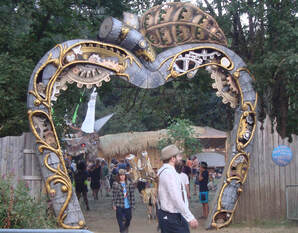 The Oregon Country Fair (OCF) is an annual event that has been going on since 1969. I have only been to couple of them. It’s my favorite hippie gathering. Today, the attendance is usually about forty-five thousand people. It’s an environmentally friendly extravaganza with live music everywhere and more than nine hundred artisans or food sellers who build large removable structures to live and work in for a couple of weeks. Although the fair itself is only three days, the village is erected earlier and stays up longer. It has been a large part of the counter-culture movement for many decades. The formal part of the fair is pretty wild, pushing at the boundaries, but the after dark scene is indescribable. Anything and everything goes. Amber had been along on the ride for many of our major events from California on. We had made the effort to stay connected. It was always wonderful and refreshing to see her and her two daughters. She was still living on Mount Adams, taking jobs where she could get them and eventually making tempeh for a man who would later make his fortune with it. We spent a couple of days with her then because she was one of long-term and loyal employees of the tempeh company, she was working the fair. So, when it was time to head back to New York, we decided to go to the fair on our way home. It would be fun, and some of the friends we hadn’t seen yet would be there. Sure enough, we ran into our old neighbors from Portland who had initiated our move to the coast. They were there with their two sons and daughter. The younger son was a couple of years older than Jessie and, when she was five, turned her on to coffee beans as a snack. He was a lovable troublemaker. I have always loved the troublemakers because I understand them. I always know where I stand with them. Some kids are sneaky, leaving you always guessing. Some kids are so sweet you don’t trust them. Baird was genuine, and I could tell that there was mutual appreciation. Late in the afternoon, Baird came running up to me and handed me a beautiful silk scarf. I was so touched. Then, it hit me. “Baird,” I said, “did you steal this?” he gave me a sheepish grin then looked away. I insisted that he return it. I hope that he did. I know that I cherished the thought and effort.
When it was time for the gates to close, Amber managed to sneak us through the dragnet so that we could enjoy the party. Unfortunately, we were exhausted with two kids and no place to crash except in our car. Paul was reaching the end of his rope, Justin was starting to drag, and we were all ready to head home. We said goodbye and started on our journey back home to “the only Stephentown on earth.” The next day, Justin found some dimes and put them into the slots of the tone drum I had bought there. Try as I might, I could never get them out and think of that day every time I play it. I think that because the drive home was uneventful, maybe even boring, that exhaustion that we started to feel at the fair just grew. It was feeling to not have to worry about money for the first time ever. We ate out and stayed in motels on the way back. It was still a good trip and rare for Paul and me not to argue about anything. We were both feeling good. Then, just outside of Amsterdam, New York, we both started feeling anxious. We later noticed that we often experienced that feeling on that stretch of road. I was driving and was feeling tense, so I turned the volume on the radio down. Paul angrily turned it back up, even louder now. I asked him to turn it down because it was stressing me out while I drove. I don’t remember clearly what happened except that there was a lot of yelling and turning the knob on the radio until suddenly, Paul started hitting me. He had never done anything like that before. I was driving sixty miles an hour down the highway and lost control of the car, spinning once and weaving back and forth across the lanes until I was finally able to pull over onto the shoulder. I jumped out of the car and went around to the back. Jessie was hysterically crying. Justin had passed out, probably the smartest thing. I dragged them both out of the car and stood there, shaking and wondering what to do next. Paul also immediately got out and apologized explaining that it was all my fault, but he was sorry for the way he had reacted. If I had just left the radio alone, it would have been fine. I didn’t say a word. I didn’t look at him. I just stood there holding my children, shaking and thinking, wondering if I should hitchhike with them back home or maybe to my parents’ home. Crying, he finally convinced me to get back in the car and drive home. I had refused to let him drive us. I didn’t speak to him for three days then told him that unless he was willing to go to marriage counseling or his own counseling, I wanted to separate. He was adamantly against any kind of therapy and chose to move out of our new home, leaving me with two children in a mobile home that we had just moved into that was forty-five minutes from my job and their school. The only person I had any connection to in this town was our young bass player, John. Paul agreed to wait until fall to move out since we hadn’t really even moved in completely. There was unpacking and repairs to be done. We knew nothing about owning a home, especially a mobile home. We were still working on the driveway. There were soft spots where we didn’t have enough crushed stone. We had put up a rickety front stoop with steps going up to the door and had installed the septic system. We’d bought the place dirt cheap because it needed a lot of work to make it livable. There was no skirting which keeps everything from freezing, so Paul arranged to work with a friend putting that in before he left. Neither of them had ever done any construction work and put the two by fours up with eight feet between them, forgetting that you have to have a place to nail them in. Now there was a gap in each section. I didn’t realize that he also hadn’t gotten enough insulation for the inside. He had read or been told that you needed venting anyway, we put heat tape on all the pipes and hoped for the best. Paul was angry and bitter and wanted me to just forgive and forget. Things before the trip had been getting worse and worse between us with constant fighting. I still loved him but couldn’t live that way anymore. Sadly, when I told Jessie that Paul was moving out, her response was, “What took you so long?” I was floored. I have no idea if I even responded. I was like a zombie those days. I was working at The Free School making little money and giving music lessons where and when I could. We had a band together that was playing out at most of the local clubs. I had two children that I was solely responsible for and was scared to death. I’d fallen into that trap that many women fall into. At least for now, I could depend on Paul sharing the money he had inherited. He was always generous in that way with me and everyone. But he refused to see his kids. He moved into a friend’s apartment, started drinking and doing hard drugs, and he didn’t want them to see him like that. They, especially Justin, didn’t understand. |
Archives
January 2024
Categories
All
|

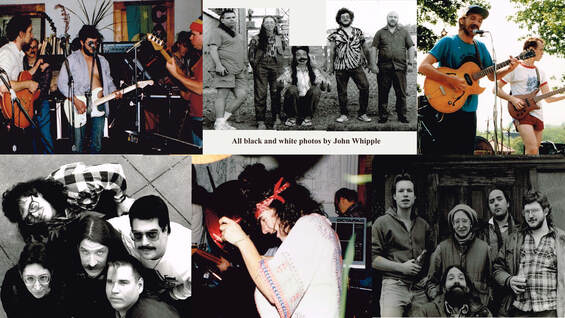
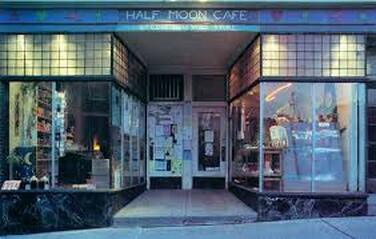
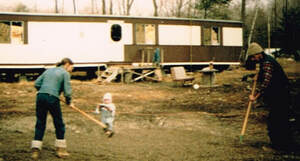
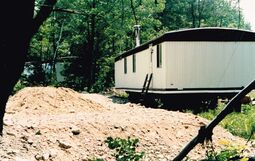

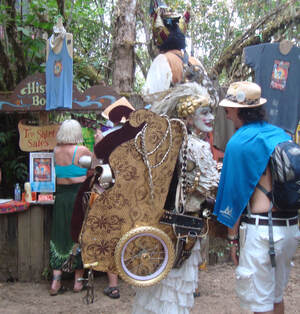
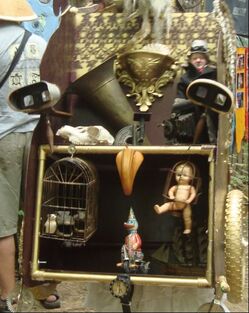
 RSS Feed
RSS Feed